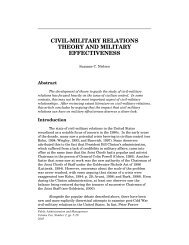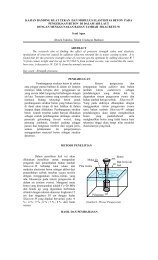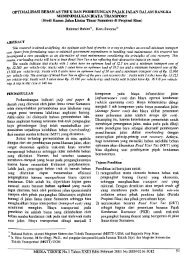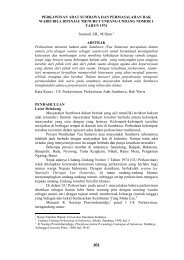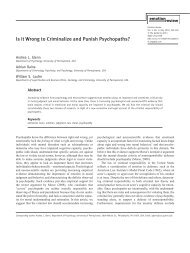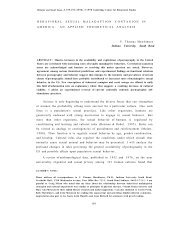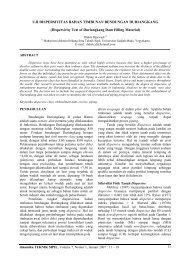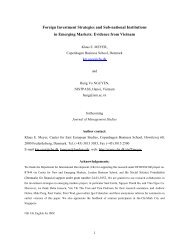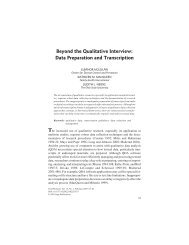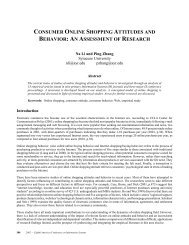The Invisible Black Victim: How American Federalism Perpetuates ...
The Invisible Black Victim: How American Federalism Perpetuates ...
The Invisible Black Victim: How American Federalism Perpetuates ...
You also want an ePaper? Increase the reach of your titles
YUMPU automatically turns print PDFs into web optimized ePapers that Google loves.
opportunities for alternatives. Lawmakers get the message. As one Philadelphia council<br />
member put it, ''If the federal government gave us more money on front sideFproviding more<br />
money for schools and job opportunitiesFwe wouldn't have to put in so much money on the<br />
back side [prisons and police]'' (Interview 207, 20 Aug. 2003).<br />
To be clear, local lawmakers consistently reported that all their constituents demanded more<br />
police on a regular basis and that there was very little sympathy for violent offenders.<br />
Virtually none of the local lawmakers interviewed hereFleast of all the ones representing<br />
minority neighborhoodsFindicated that their constituents thought that the law came down too<br />
hard on offenders. One Pittsburgh city councilman, a former civil rights activist and<br />
representative from a predominantly black neighborhood, said that his constituents had ''very<br />
little sympathy for criminal actors, whether they are the shooter or the shot'' (Interview 103,<br />
10 June 2003). In fact, few of the local crime hearings reviewed here involved criticism of the<br />
police, but there was quite a lot of praise. At a 2006 Philadelphia hearing on reducing<br />
violence, a representative from the Philadelphia Alliance for Community Improvement told<br />
the city council, ''[<strong>The</strong> police] do their job and we know that firsthand, because we've been to<br />
find out firsthand for ourselves'' (Council of the City of Philadelphia, Joint Hearing of the<br />
Public Safety and Public Health and Human Services Committees, 13 Feb. 2006, p. 107).<br />
Contrary to conventional liberal conceptions of minority views of crime and the police in<br />
national political discourse, the evidence from the two urban locales under study here reveals<br />
fairly muted concern for police behavior, which is subverted to more concerted pressure on<br />
issues such as education, jobs, neighborhood development, and opportunity.<br />
In other words, the strong desire for more policing is equally matched by strong pressure to<br />
improve neighborhood conditions, thereby lessening the likelihood that young people will get<br />
into trouble with the law in the first place. A Pittsburgh councilwoman put it this way with<br />
respect to drug violence: ''<strong>The</strong> community wants really bad guys locked up. <strong>The</strong>y don't want<br />
their lives to be in jeopardy. But they also wanted us to get to the root of the drug dealing''<br />
(Interview 103, 10 June 2003).<br />
This message of impressionable children being subjected to neighborhood conditions that<br />
promote criminality and the need to address social problems such as education, job, and<br />
recreation opportunities before they generate street criminals is largely lost as crime issues<br />
make their way to higher levels of government, while support for getting violent criminals off<br />
the streets is magnified. In stark contrast to the victim-centered approaches of local groups<br />
pressuring lawmakers on guns, for example, national gun debates have largely resulted in the<br />
ratcheting up of penalties for crimes committed with a gun or anemic regulations that are<br />
difficult to enforce, later reversed, or declared unconstitutional.16 Locally, few advocate such<br />
consequences, not because they have less punitive views but because they are focused on a<br />
wider set of problems. Few believe that locking up offenders for longer will stem the tide of<br />
gun violence because it is clear that one offender is quickly replaced with another.<br />
This illustrates one of the central problems when crime politics migrate from local to national<br />
levels. <strong>The</strong> ''get the guns off the street'' language of local advocacy groups, while broad and<br />
openended in its policy implications, is most easily transmitted as a ''lock up the gun<br />
offenders and throw away the key'' strategy. Even the national civil rights and public interest<br />
groups that might serve as a counterweight and promote a broader social agendaFsuch as the<br />
NAACP, ACLU, or <strong>American</strong> Friends Service CommitteeFare drawn into the dichotomies of<br />
single-issue national crime politics such as police misconduct or penalties for gun and drug



